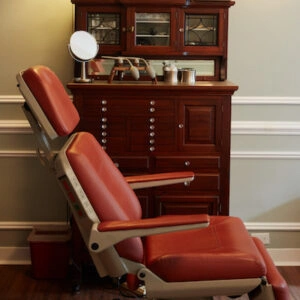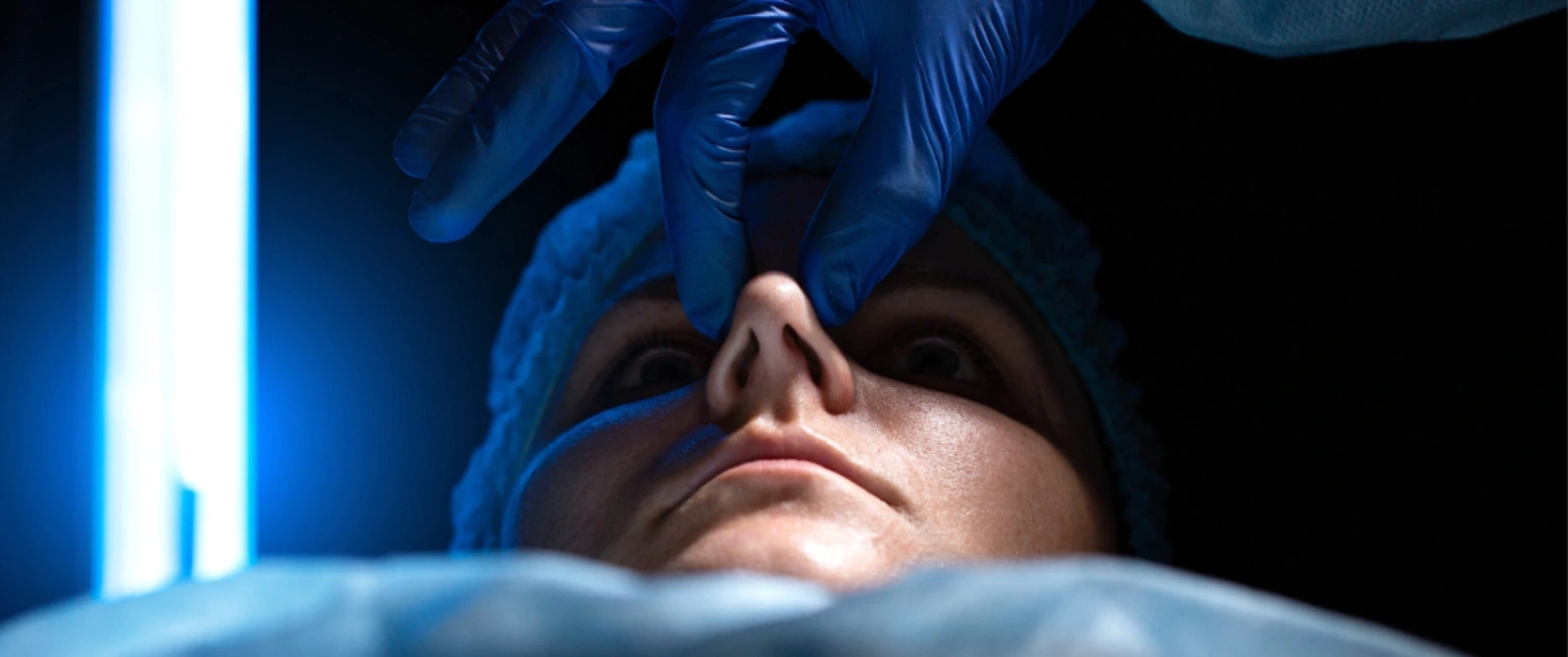Breathe well again and avoid infections with sinus surgery
Drawing on more than ten years of expertise, Dr. Mourad has guided numerous patients from Brooklyn in overcoming sinus concerns, including sinusitis, nasal congestion, headaches, and other related conditions. By combining advanced technology with the most current treatment methods, he delivers personalized solutions designed to meet each patient’s needs. If you live in Brooklyn and are seeking to ease chronic sinus pain or breathe more comfortably, Dr. Mourad is dedicated to supporting your health and enhancing your quality of life.
Book an appointment to determine if you need sinus surgery in Brooklyn
What is sinus surgery?
Inside your nose, there are numerous tiny cavities and connecting channels that link to one another and to each side of the nasal passages. Sinus surgery is designed to widen these channels and remove significant portions of the walls of these spaces, which helps keep the sinuses from becoming obstructed and allows mucus to drain more freely. By maintaining open sinus passages, pressure buildup within the nose is minimized, resulting in fewer and less severe sinus infections. Additionally, the expanded spaces improve the effectiveness of treatments such as saline rinses and topical medications by allowing them to reach deeper areas of the sinuses.
What are the different types of sinus surgery?
The main techniques used to achieve better sinus drainage include Functional Endoscopic Sinus Surgery, known as FESS, and Balloon Sinuplasty. In more complex situations, such as revision procedures or involvement of sinuses near the eyes or brain, surgeons may also utilize Image Guidance to navigate safely and accurately while performing the surgery.
Functional endoscopic sinus surgery (FESS)
The most commonly performed sinus procedure is Functional Endoscopic Sinus Surgery, widely referred to as FESS. This technique employs a specialized instrument called an endoscope, which is a slender, flexible tube fitted with both a light and a miniature camera. The endoscope is carefully inserted through the nostrils, granting the surgeon a direct and detailed view of the sinus cavities. During the procedure, any blockages such as nasal polyps, bone spurs, or other obstructions can be precisely removed, and the sinus openings are enlarged to improve drainage and decrease inflammation. Typically, FESS is conducted under general anesthesia, and the length of the operation depends on the complexity and extent of the sinus issues being treated.
Image-guided surgery (IGS)
A three-dimensional image-guidance system may also be used to enhance surgical precision. This system utilizes your preoperative CAT scan to track the position of surgical instruments inside the nasal passages and sinuses in real time. Image guidance serves as a valuable tool during FESS or selected Balloon Sinuplasty procedures, particularly in cases involving revision surgeries or sinuses located close to sensitive structures such as the brain, eyes, and essential nerves and blood vessels. This added layer of navigation improves safety and accuracy during intricate sinus surgeries.
Balloon Sinuplasty
Balloon sinuplasty represents a minimally invasive option for patients experiencing blocked sinus passages. A small balloon catheter is inserted through a wire guide into the larger sinuses, and the balloon is then carefully inflated with water to expand the sinus openings. This process enlarges the passageways, facilitating improved sinus drainage and relief from pressure. While effective for three out of the four main sinus cavities, balloon sinuplasty does not remove diseased or infected sinus tissue. Patients with nasal polyps or ethmoid sinus disease are typically not candidates for this procedure due to the need for a more comprehensive surgical approach.
Open sinus surgery
In other situations, a more traditional surgical approach may be indicated. This method involves creating small incisions, often within the nostrils or along the upper lip, allowing the surgeon to access the sinus cavities directly. This type of surgery is used when balloon techniques are insufficient or when more extensive tissue removal is required.
Transoral endoscopic surgery
Another innovative method being developed involves performing sinus surgery through the oral cavity. Using an endoscope, the surgeon can access and clear blockages within the sinuses without making external incisions. This minimally invasive approach provides an alternative for patients seeking effective sinus relief while minimizing external scarring and disruption to surrounding tissues.
Discuss risks associated with each sinus surgery option with Dr. Mourad
It is important to recognize that each form of sinus surgery carries unique considerations, including indications for use and potential complications. Determining which type of surgery is appropriate depends on the patient’s specific condition, the severity of the sinus problem, and any previous treatments attempted. During consultation, your doctor will carefully review your situation, explain the potential risks and benefits, and assist in deciding whether surgical intervention is the most suitable option.
When is sinus surgery required?
Acute sinusitis is defined as a sinus infection lasting less than one month, while chronic sinusitis occurs when infections persist despite treatment with antibiotics or corticosteroids. Both acute and chronic sinusitis can have a substantial impact on quality of life, leading to ongoing discomfort, fatigue, and interference with normal daily routines.
Patients who experience frequent episodes of acute sinusitis each year or have chronic sinusitis that has failed to respond to medical therapies are often advised to consider sinus surgery. The associated decline in quality of life may manifest as missed work or school, prolonged periods of sinus-related suffering, continuous fatigue, or even mood disturbances such as depression. Anyone dealing with these challenges should consider speaking with Dr. Mourad about surgical options that can help restore comfort, improve sinus function, and enhance overall well-being.
Patients who experience frequent episodes of acute sinusitis each year or have chronic sinusitis that has failed to respond to medical therapies are often advised to consider sinus surgery. The associated decline in quality of life may manifest as missed work or school, prolonged periods of sinus-related suffering, continuous fatigue, or even mood disturbances such as depression. Anyone dealing with these challenges should consider speaking with Dr. Mourad about surgical options that can help restore comfort, improve sinus function, and enhance overall well-being.
Recurring infections
Even with consistent medical management, some individuals continue to suffer from recurrent sinus infections. In such situations, surgery may be advised to restore optimal sinus health, improve airflow through the nasal passages, and reduce the likelihood of repeated infections. Surgical intervention can address underlying structural or anatomical issues that contribute to persistent sinus problems, ensuring long-term improvement.
Chronic sinusitis
Chronic sinusitis occurs when inflammation of the sinuses persists over time, causing ongoing symptoms such as facial pressure, headaches, nasal blockage, and a reduced ability to smell. When conservative treatments like medications, nasal sprays, or saline irrigation fail to provide relief, surgical procedures may be necessary. Surgery helps open blocked sinus passages, reduce inflammation, and improve overall sinus function, allowing patients to experience fewer symptoms and enhanced breathing.
Nasal polyps
Nasal polyps, which are small growths that may develop in the nasal or sinus passages, can further obstruct airflow and contribute to chronic sinus infections. Surgical removal of these polyps can restore proper sinus drainage, reduce the risk of recurring infections, and improve overall sinus health. This procedure can be a critical step for individuals who have struggled with persistent sinus issues despite medical therapy.
Structural problems
Certain structural problems within the nose, including a deviated septum or overly enlarged turbinates, can significantly impede sinus drainage and airflow, contributing to persistent sinus infections or inflammation. Sinus surgery can correct these issues by realigning or reducing obstructive structures, allowing for better sinus function and improved breathing. Addressing these anatomical concerns can help prevent recurrent sinusitis and enhance overall comfort.
It is important to recognize that surgery is not always necessary for every sinus-related condition. Determining the need for surgical intervention should involve a detailed consultation with an experienced otolaryngologist like Dr. Moustafa Mourad, who specializes in sinus surgery. With a careful assessment of each patient’s unique situation, Dr. Mourad can provide guidance on whether surgery or alternative treatments are best suited for achieving optimal sinus health.
It is important to recognize that surgery is not always necessary for every sinus-related condition. Determining the need for surgical intervention should involve a detailed consultation with an experienced otolaryngologist like Dr. Moustafa Mourad, who specializes in sinus surgery. With a careful assessment of each patient’s unique situation, Dr. Mourad can provide guidance on whether surgery or alternative treatments are best suited for achieving optimal sinus health.
Get sinus surgery in Brooklyn
What is a sinus infection (Sinusitis)?
The inside of your nose contains a series of connected cavities that normally allow mucus to flow and drain efficiently. When these spaces become swollen or blocked, bacteria can accumulate, leading to sinus infections. Frequent causes include the common cold, allergic rhinitis, or a deviated septum, which can obstruct proper drainage. Symptoms may present as facial pressure or discomfort, headaches, thick yellow or green nasal discharge, severe nasal congestion, and feelings of fatigue. In many cases, sinusitis resolves on its own within a few days through rest, adequate hydration, and Vitamin C.
If the symptoms do not improve within a week or become more severe, this often indicates a bacterial sinus infection. Prompt medical consultation is advised to determine whether antibiotics are needed to eliminate the infection and restore normal sinus function.
If the symptoms do not improve within a week or become more severe, this often indicates a bacterial sinus infection. Prompt medical consultation is advised to determine whether antibiotics are needed to eliminate the infection and restore normal sinus function.

How do I treat my sinus infection?
For the first several days of dealing with sinus issues, it is recommended to focus on supportive care: drink plenty of fluids, ensure sufficient rest, avoid caffeine and alcoholic beverages, rinse your nasal passages regularly with saline using a Neti pot, and consider taking Vitamin C to aid recovery. Should your symptoms continue beyond seven days, or if headaches intensify or nasal discharge becomes more discolored and thick, it is likely that a bacterial sinus infection has developed, requiring antibiotics. A medical professional can prescribe a treatment that targets the most common sinus bacteria, and in some cases, a topical or oral steroid may also be used to reduce inflammation within the sinus cavities. Seeing an otolaryngologist is ideal because these doctors have specialized training in the internal structures of the nose and employ endoscopic instruments to accurately visualize and treat sinus conditions.

How can I prepare for sinus surgery?
Your consultation with Dr. Mourad is designed to be an in-depth and thorough review of your surgical goals and health needs, usually lasting about one hour. During this appointment, Dr. Mourad will assess your individual concerns, determine the specific causes behind your symptoms, and design a surgical and post-surgical plan that is completely customized for you. He may prescribe supportive medications to help manage your symptoms and improve overall outcomes. Once your tailored plan is finalized, Dr. Mourad and his team will walk you through all preoperative instructions and details, ensuring your surgery is well-organized and stress-free. The aim is to allow you to focus on your care without worrying about logistical details.
Dr. Mourad considers it a privilege to work closely with his patients and takes pride in understanding both their aesthetic goals and functional concerns. His office provides a warm, comfortable, and boutique-style environment that makes patients feel relaxed, removing the clinical tension often associated with medical visits.
Dr. Mourad considers it a privilege to work closely with his patients and takes pride in understanding both their aesthetic goals and functional concerns. His office provides a warm, comfortable, and boutique-style environment that makes patients feel relaxed, removing the clinical tension often associated with medical visits.

After the surgery, patients are generally advised to take at least three days off work and avoid heavy lifting to promote proper healing. Glasses may need to be adjusted if worn during recovery. Dr. Mourad provides all necessary post-operative medications, ointments, and nasal sprays to ensure optimal results. Follow-up appointments are scheduled at two weeks and one month after surgery, with additional long-term follow-up offered to maintain care, monitor healing, and provide ongoing support for years following your procedure.
Will insurance pay for my sinus surgery in the United States?
In the United States, most health insurance plans recognize sinus and breathing disorders as functional conditions that qualify for coverage under surgical procedures. Our team will carefully verify your benefits ahead of your visit, providing a clear summary of what your insurance will cover so you can plan without concern. We manage all necessary documentation, submit claims, and obtain prior approvals to ensure a smooth process for your procedure. Dr. Moustafa Mourad possesses extensive training in sinus surgery, as well as expertise in rhinoplasty, repairing broken noses, and nasal valve reconstruction. If you suffer from sinus problems or related breathing issues, please reach out to our office. We are committed to assisting you with professional guidance and comprehensive care.
How can Dr. Mourad help you?
When patients in Brooklyn get in touch with our office, our welcoming team will gather your basic information and schedule your appointment at a convenient time. Should your visit involve insurance, we will confirm your benefits and review them with you. Thanks to our no-surprise billing policy, you’ll always understand your financial responsibility upfront. With Dr. Mourad’s broad expertise in eyelid and facial surgery, your aesthetic concerns are met with the highest level of care. If you are in Brooklyn and interested in an evaluation of your eyes or other facial features, we encourage you to contact us.

